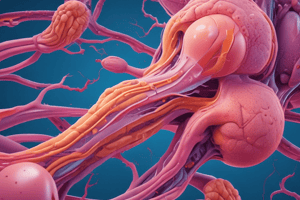Podcast
Questions and Answers
What is the primary male reproductive organ responsible for producing both sperm cells and testosterone?
What is the primary male reproductive organ responsible for producing both sperm cells and testosterone?
- Vas deferens
- Testes (correct)
- Ejaculatory ducts
- Epididymis
Which structure is responsible for collecting sperm cells and maturing them before they are released into the vas deferens?
Which structure is responsible for collecting sperm cells and maturing them before they are released into the vas deferens?
- Testes
- Vas deferens
- Ejaculatory ducts
- Epididymis (correct)
What is the function of the vas deferens in the male reproductive system?
What is the function of the vas deferens in the male reproductive system?
- Produce testosterone
- Transport sperm cells from the epididymis to the ejaculatory ducts (correct)
- Carry sperm cells to the urethra during ejaculation
- Connect the testes to the vas deferens
Where do the ejaculatory ducts carry sperm cells, seminal fluid, and prostate secretions during ejaculation?
Where do the ejaculatory ducts carry sperm cells, seminal fluid, and prostate secretions during ejaculation?
What is the function of the bulbourethral glands in males?
What is the function of the bulbourethral glands in males?
What role does Testosterone play in the male reproductive system?
What role does Testosterone play in the male reproductive system?
Which hormone stimulates the production of testosterone by Leydig cells within the testes?
Which hormone stimulates the production of testosterone by Leydig cells within the testes?
How is erectile function regulated in males?
How is erectile function regulated in males?
What is the primary function of seminal vesicles in the male reproductive system?
What is the primary function of seminal vesicles in the male reproductive system?
What neurotransmitter relaxes smooth muscle tissue within the corpus cavernosum during erection?
What neurotransmitter relaxes smooth muscle tissue within the corpus cavernosum during erection?
Flashcards are hidden until you start studying
Study Notes
Human Male Reproductive System: Anatomy, Sperm Production, Hormonal Regulation, and Sexual Function
The human male reproductive system is a complex and intricate network of organs and structures that function together to create, maintain, and transmit sperm cells, as well as produce and regulate crucial hormones. In this article, we'll delve into the anatomy, sperm production, hormonal regulation, and sexual function of the male reproductive system.
Anatomy
The male reproductive system comprises the following key structures:
- Testes: The testes are the primary male reproductive organs responsible for producing sperm cells and testosterone, a crucial hormone. Each testicle is roughly the size and shape of a large almond and is suspended in the scrotum, a pouch of skin that maintains a temperature slightly lower than the body to protect sperm production.
- Epididymis: The epididymis is a long, coiled tube connecting the testes to the vas deferens. It's responsible for collecting sperm cells and maturing them before they're released into the vas deferens.
- Vas deferens: The vas deferens is a muscular tube that transports sperm cells from the epididymis to the ejaculatory ducts during ejaculation.
- Ejaculatory ducts: The ejaculatory ducts connect the vas deferens to the urethra and carry sperm cells, seminal fluid, and prostate secretions into the urethra, where they are expelled during ejaculation.
- Prostate gland: The prostate gland is a small, walnut-shaped gland that produces a milky fluid containing enzymes and nutrients that provide a favorable environment for sperm cells.
- Seminal vesicles: The seminal vesicles are sac-like glands that produce a thick, alkaline fluid that helps neutralize the acidity of the female reproductive tract and enhance sperm motility.
- Bulbourethral (Cowper's) glands: The bulbourethral glands produce a clear, slippery fluid that lubricates the urethra and neutralizes any residual acidity, making it easier for sperm cells to travel through the female reproductive tract.
Sperm Production
Sperm production, or spermatogenesis, occurs within the seminiferous tubules of the testes. In this process, spermatogonia, or sperm stem cells, undergo a series of divisions and differentiations to develop into sperm cells. In approximately 64 days, a single spermatogonium will produce four sperm cells through a series of meiotic divisions.
Hormonal Regulation
The male reproductive system is regulated by a complex hormonal system involving several key hormones:
- Testosterone: Produced by the Leydig cells within the testes, testosterone is the primary male sex hormone responsible for the development and maintenance of male secondary sexual characteristics.
- Follicle-stimulating hormone (FSH): Produced by the anterior pituitary gland, FSH stimulates the production of spermatogonia and the development of Sertoli cells within the testes.
- Luteinizing hormone (LH): Produced by the anterior pituitary gland, LH stimulates the production of testosterone by Leydig cells within the testes.
- Anti-Müllerian hormone (AMH): Produced by Sertoli cells within the testes, AMH inhibits the development of female reproductive structures in males and regulates spermatogenesis.
Sexual Function
Sexual function in males is regulated by the autonomic nervous system (ANS) and involves several key neurons and neurotransmitters:
- Erectile function: Erectile function is regulated by the ANS, with the parasympathetic nervous system promoting erections and the sympathetic nervous system inhibiting erections. Nitric oxide (NO) is a critical neurotransmitter that relaxes smooth muscle tissue within the corpus cavernosum, allowing for increased blood flow and an erection.
- Orgasm: Orgasm is regulated by the release of various neurotransmitters, including dopamine, serotonin, and oxytocin, which contribute to the pleasure and satisfaction experienced during sexual activity.
In summary, the human male reproductive system is a complex network of organs and structures that work together to produce sperm cells, regulate hormones, and facilitate sexual function. This fascinating system plays a crucial role in human reproduction and overall health.
Studying That Suits You
Use AI to generate personalized quizzes and flashcards to suit your learning preferences.




